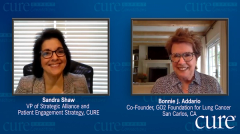
Navigating Emotional Response to a Lung Cancer Diagnosis
Considerations for the emotional impact of a lung cancer diagnosis and how patients can be supported during their treatment journey.
Episodes in this series

Allison Collins: I kept trying to rationalize, I said, "Do you think it’s pneumonia?" Because I just did not want it to be lung cancer. My mother had passed away from small cell lung cancer, and in my mind I thought I would be dead in nine months. I didn’t handle it really well. I think I cried the whole time through all of the procedures. I did end up having the biopsy. Before she did the biopsy she told me that she wanted to do genetic testing on it due to my age. That’s where things escalated for me.
Vamsidhar Velcheti, M.D.: Allison, how did you cope with the whole process and the navigation of seeing a bunch of doctors? You’ve never gone through something as terrible as this, and you’re going through all these invasive procedures. How did you navigate through this? Were there any support systems there, social workers, or psychologists you had met, that helped you process and handle the situation?
Allison Collins: In the beginning, I don’t think I saw any psychologist. I don’t think I saw a social worker in the beginning. I didn’t see a social worker until after I started treatment. Maybe had I had someone like that to come and talk to me in the beginning it would’ve been easier, but it was overwhelming for me.
Vamsidhar Velcheti, M.D.: I know there’s a lot of information thrown at you, and obviously you don’t know what all this means. I can only imagine how stressful that would be.
Transcript edited for clarity.







